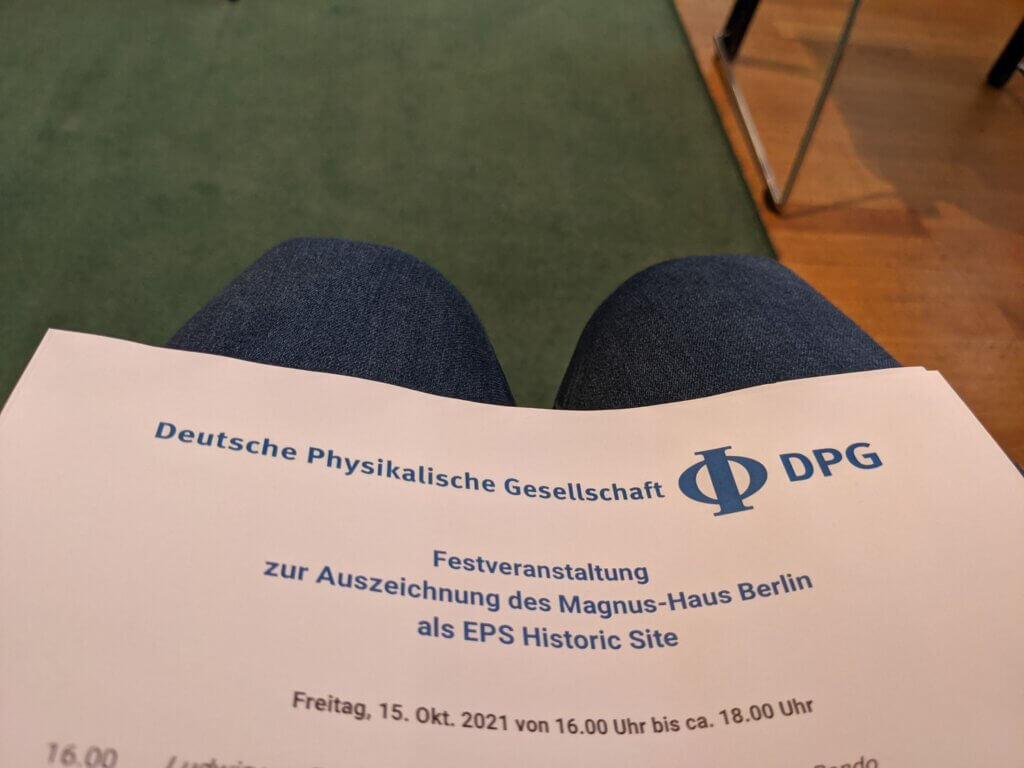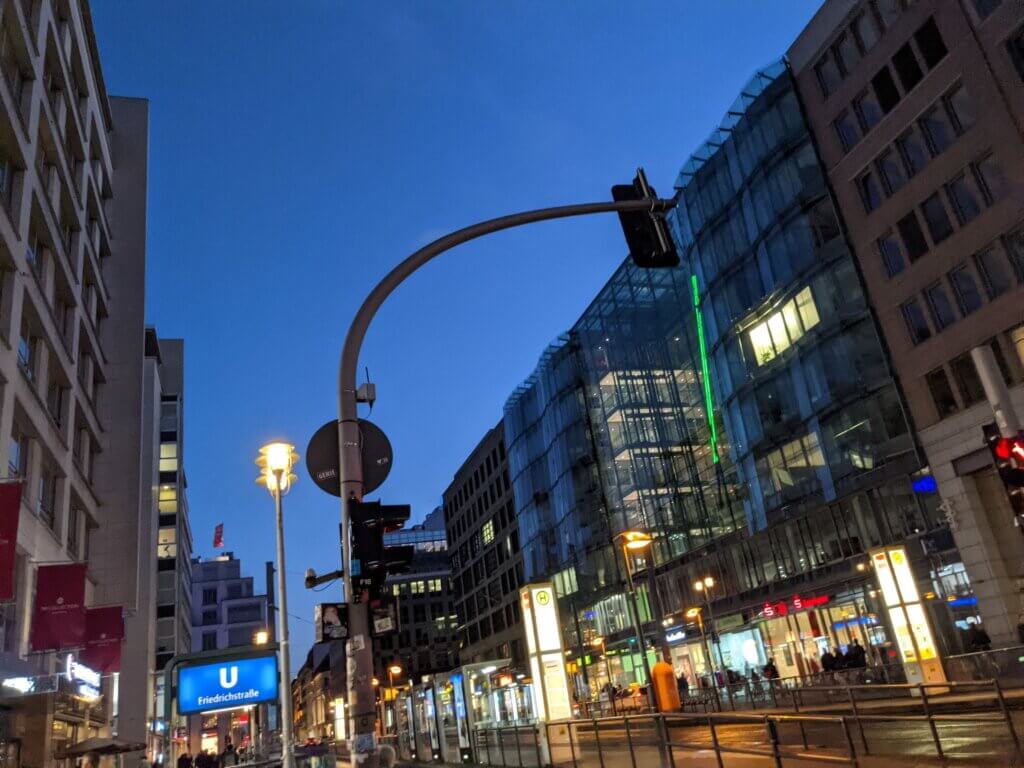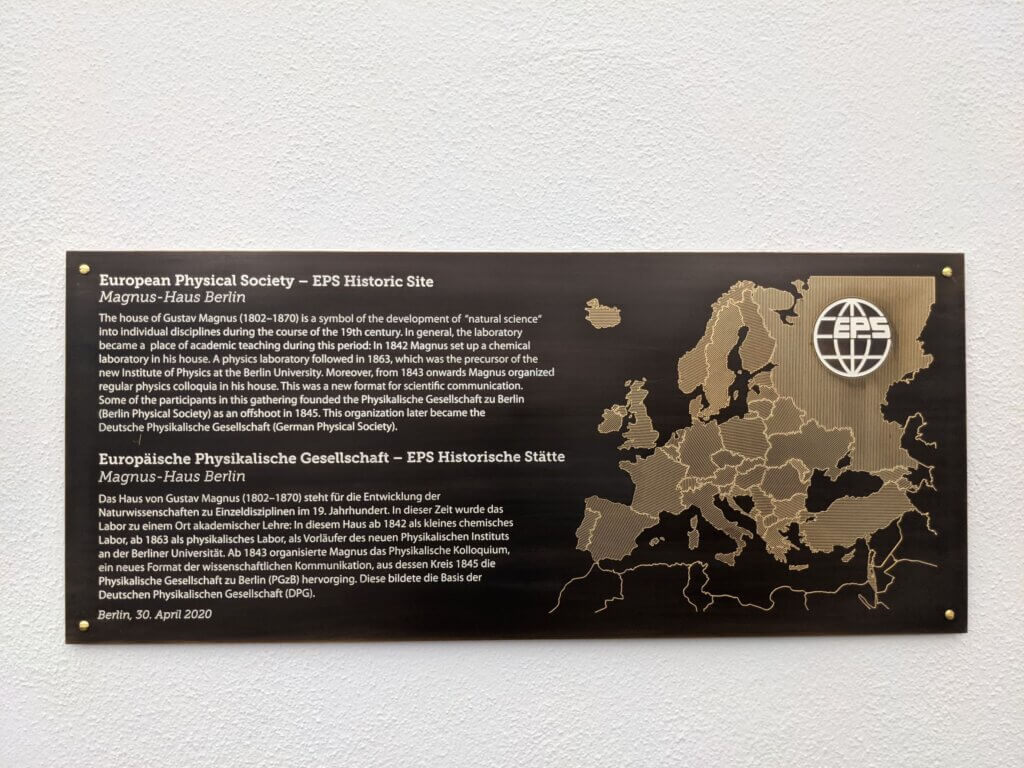Reading time: 12 minutes

LIFE STORIES The Magnus-Haus, capital representation of the DPG and seat of the regional association Physikalische Gesellschaft zu Berlin, is an important European site of the scientific history of physics. After the designation as EPS Historic Site, the ceremonial unveiling of a commemorative plaque by the presidents of the European Physical Society (EPS), Luc Bergé, and the German Physical Society (DPG), Lutz Schröter, followed on October 15, 2021, during a festive event. I was able to attend this event as a member of the Potsdam regional group of the jDPG. An unique day in the world of the DPG.
Note up front: In fact, this article was written at the beginning of my university life about 7 weeks ago. In the meantime, a lot has happened: I have settled in Potsdam, made new friends, and have been involved to an unbelievable extent with “real” mathematics (as opposed to school mathematics), experimental physics, and astronomy. The amount of assignments has been incredible and so my blog has lagged a bit lately. I really hope that I can find a balance between university and my hobbies in the next months. And then, of course, there will be more content from me again: about school, university and learning in general.
Monday, 4:53 pm. I’m sitting with my laptop on my lap on the Golm campus of the University of Potsdam and can hardly believe that one week – my first week – of university life is already over. I’m surprised at how open the students are here and how quickly you make connections. And I’m already noticing that university mathematics is on a completely different level than school mathematics. All of a sudden, my life has turned around 180 degrees and is offering me opportunities I would never have dreamed of. So I can actually claim to have met last Friday not only the president of the German, but also the president of the European Physical Society.
DPG – Membership (and more …)

Due to my physics baccalaureate award, I have been a member of the DPG (German Physical Society) for one year free of charge since July this year. Besides the monthly delivered journal PhysikJournal, this also gives me access to numerous DPG events. However, since I had not yet made it to such an event, I was all the more pleased when one of my fellow students suggested that I attend a festive event in Berlin. Without knowing what to expect, I agreed and inwardly said goodbye to the bar crawl I had also planned that evening. Such an opportunity seemed unique to me, so I did not want to let it pass.
The rainy afternoon of the 15/10/2021 arrived. I was the only one who had followed the call of my fellow student, let’s call him Richard, so we set off for Berlin just the two of us. We waited in vain for our train and realized too late that it was leaving from a different track that day (without any information board saying so). So we had no choice but to hope for the following train 30 minutes later. Ah yes, the Deutsche Bahn (German railroads) at its best …
Only when we finally sat in the train, I learned from Ricard more about the event coming up to me in the Magnus-Haus, capital representation of the DPG and seat of the regional association Physikalische Gesellschaft zu Berlin. It was a celebration of the Magnus-Haus Berlin’s designation as an EPS Historic Site … and the presidents of the German (DPG) and European Physical Society (EPS), among others, would be in attendance.In addition, a piece for violin and cello by Beethoven would be played live, which Richard pointed out was “musical accompaniment appropriate to the occasion.”
The two of us were allowed to watch as representatives of the young DPG. Before I knew it, I belonged to the young DPG regional group Potsdam, which just has been founded by Richard and other students. The size of our German capital struck me anew. All the lights, cars, streetcars, thousands of people of all looks. But we had no time to marvel at the city, because time was pressing. We entered the Magnus House just 3 minutes before the event began. Wrapped in scaffolding, I would hardly have noticed it as we walked by. We took our things to the checkroom and crossed two small halls until the door to the event room opened for us.
About 20 people, all dressed in suits or high-end costumes, stood spread out among the chairs in the room. Immediately we were welcomed and introduced to the high-ranking DPG members. I felt like I was in another world and hoped that I was not underdressed in my red and black sweatshirt and blazer combo with jeans.
The world of the DPG

Shortly after 4 p.m., the event began – as announced by Richard – with a piece of music by Beethoven, played by two extremely talented young musicians, before Professor Dr. Oliver Bendson, President of the Physikalische Gesellschaft zu Berlin, welcomed the guests. I sat quietly listening as Luc Bergé and Dr. Lutz Schröter, presidents of the EPS and the DPG, also gave welcoming remarks.Two more excellently played pieces of music followed. Then Dr. Stefan L. Wolff from the Deutsches Museum in Munich started his lecture on “The Magnus House Berlin as a historical site of physics development between 1840 and 1870”, where we learned more about the background of the event.
Nearly 30 minutes this first lecture lasted and I couldn’t help but let my mind wander. I still couldn’t believe that I was actually sitting here among these tall people, listening to a moderately interesting lecture. Was this what I wanted? Did I want to attend such events more often in the future? I didn’t know the answer. But I knew that if I really wanted it, I could do it. This could actually be my future. Unobtrusively, I took a few photos (don’t worry, that was allowed) and was annoyed that I hadn’t brought my camera. Well, I would do that next time (if there was a next time).
Now followed another lecture in which Prof. Dr. Ingolf V. Hertel of the Max Born Institute Berlin presented more landmarks of the history between DPG and Magnus House. I had never been the biggest fan of history, but listening to such a lecture in this setting was something completely different than listening to a teacher lecture in school. The years presented flowed into each other – until the year 2001 brought a turn in the development of the Magnus House.
Apparently, the Berlin Senate had secretly sold the building to Siemens AG for less than its value (the rumor mill surrounding this “incident” is bubbling). But whatever exactly happened, one thing is certain: in 2024, the Magnus-Haus will fall to the large corporation. A sad prognosis for the future. Despite well-intentioned assurances from Siemens AG that the DPG will continue to be allowed to use the building, in the end no one can say exactly what will become of the DPG’s capital city representative office in a few years’ time.
Short history of the Magnus-Haus
The Magnus-Haus in Berlin’s Mitte district, built in the 18th century, is now considered the oldest physics building in Germany. First inhabited by Louis Lagrange, one of the founders of analytical mechanics, it was acquired in 1840 by Professor Gustav Magnus (famous among other things for discovering the Magnus effect).
The associate professor of technology, who never specialized in physics but had taught the subject since 1833, set up his private physics laboratory in the Magnus House in March 1843. At that time, it was not only a place of work and a social meeting place for students, but is today considered to be the oldest physics institute in Germany. What’s more, the physical colloquium (literally for “scientific discussion”) gave rise to the Physikalische Gesellschaft zu Berlin in 1845. Important scientists who worked there in Magnus’ time included J. W. Gibbs, H. Helmholtz and W. Siemens.
With Magnus’ death in 1870, physics initially moved out of the building. After serving the Society for German-Soviet Friendship at the beginning of the GDR, the building was handed over by Mayor Ebert to the Physical Society of the GDR for permanent use in 1958 on the occasion of Max Planck’s 100th birthday. In the 1990s, the building underwent a major renovation, financed in part by Siemens AG, before the DPG signed a 30-year usage agreement with the city of Berlin in 1994.
Today, it serves as a bridge between science, business and politics. In 2001, the Senate’s decision to sell the building for (only) DM 2.8 million to Siemens AG, which sees its historical roots here with Magnus’ student Ernst Werner Siemens, caused a sensation. The DPG will remain the owner of the building until 14/02/2024. What the future holds for this important DPG location after 2024 is uncertain, although Siemens AG assures the DPG that it can remain the main tenant of the premises.
Experiences for the future
After this shock and a last piece of music, shortly after 5:30 p.m. – now the mood was solemn again – the commemorative plaque in the entrance hallway of the building was unveiled. Proudly Richard and I stood next to the other participants and smiled for the camera while Luc Bergé took the decisive step. Congratulations were offered to each other and we turned to the drinks at the champagne reception. I too decided to try a glass of the sparkling wine (or was it champagne?). When else did I have this opportunity?
Getting into conversation with the people there proved difficult, as Richard and I both didn’t know how to approach them. But somehow it all worked itself out and a few minutes later I was posing with Luc Bergé and Dr. Lutz Schröter in a photo in front of the memorial plaque. Slowly, the event drew to a close and I felt slightly dizzy – whether from the glass of champagne or all the excitement remains to be seen. Happily, we said goodbye to some of the guests and made our own way back.
The lights of Berlin welcomed us as we went in search of a snack. While eating, the conversation turned to, among other things, the report that my fellow student wanted to write from the event for the homepage of the RG (regional group) Potsdam. Following a sudden inspiration, I offered to write this article after all. He was happy and I was happy, too. The terms physics and journalism buzzed through my head. That’s what I wanted to do in the future, right? I was exhausted and once again I was lost in thought during the train ride to Potsdam.
A lot had happened today. I had declared myself interim PR representative of the RG Potsdam, spontaneously talked to important people and … dared to take an important step into my future. It was hard to believe that 6 months ago I was still sitting in school and had not even dreamed of this possibility. Yes, I was excited about what awaited me in Potsdam. Also about the pub crawl. In the meantime, I had decided to join the pub crawl (after all, it was only shortly after 8 p.m.). I had mastered the important part of the day. Why should I not have some fun now?

You can read my more factual event report on the homepage of the Potsdam regional group by clicking here.
By the way: It turned out to be an exciting and very exhausting first semester with some twists and turns that I didn’t expect. Curious about how I fared? Click here for the full story.

